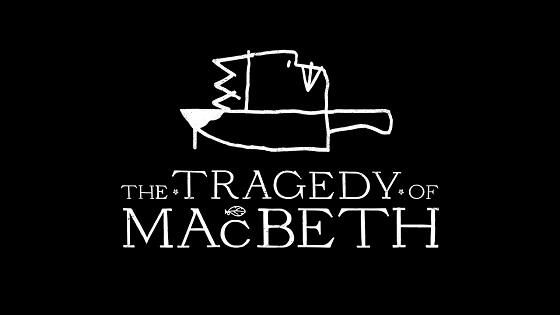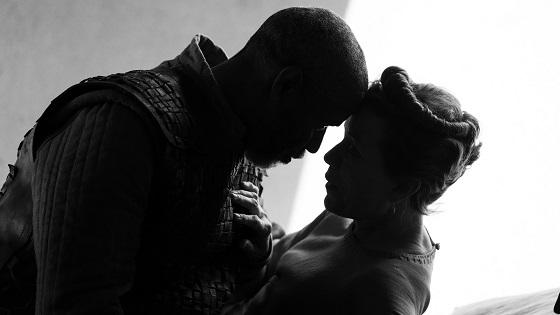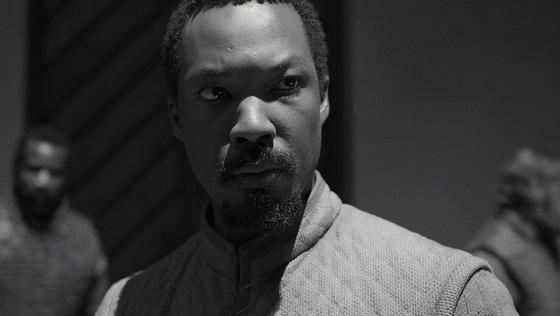

[Rating: Minor Rock Fist Up]
In theaters on Christmas Day, available on Apple TV+ January 14, 2022.
Based on one of the most famous plays by maybe the most famous writer of all time, starring what may well be the best two actors of their generation, and directed by one half of the greatest directing duo of all time, The Tragedy of Macbeth has a hell of a lot going for it. Built like some kind of cinematic fantasy sports lineup and executed with all of the ease of an all-star team playing a no-pads scrimmage, the film wants for nothing on either side of the camera. Perhaps that’s why the final product is so disappointing: not because the movie is bad, per say, but because the sum of its parts portends so much more than what remains.
For those unfamiliar, Shakespeare’s Macbeth is the story of one Scottish lord’s violent ascent to ultimate power, tracking the perils of unchecked ambition and the inevitability of fate. When the audience meets him, Scottish general Macbeth (Denzel Washington) enters the company of King Duncan (Brendan Gleeson) a hero for recent victories on the battlefield. Duncan rewards Macbeth with new titles and lands, yet the plaudits inspire little joy in the latter gentleman. Just before this encounter, a prophecy by a mysterious group of witches informed Macbeth that he would be king, and this, along with murderous whispers from his wife (Frances McDormand), inspire a plot to assassinate Duncan and assume the throne.
The murder of the king is just the beginning of the bloodshed rather than a stop to it, however, as Macbeth begins to see threats to his newfound power in all corners, especially the one occupied by his comrade in arms and co-recipient of the kingly prophecy, Banquo (Bertie Carvel). As Macbeth’s paranoia grows in tandem with his madness, the heads of men, women, and children roll while the country he rules comes apart. And while a new set of prophecies seem to imply almost supernatural protection against any harm, Macbeth finds little comfort here, lashing out further against rival lord, Macduff (Corey Hawkins), and his family.

This is the first film that Joel Coen has directed without sibling Ethan, so while watching, one naturally begins to analyze the stylistic and thematic interpretation of the source text to draw out some sense of one brother’s artistic sensibilities against the other’s. Naturally, this is a fool’s errand: films like Raising Arizona, Miller’s Crossing, A Serious Man, and Barton Fink are the product of collaboration where one could no more pull apart the contributions of one Coen as a chef attempting to separate ingredients from a week-old soup. And yet, here and there, hints flitter into Macbeth as echoes from previous works sounding in the distance.
Although the rich black and white photography and reliance on close-to-medium shots most readily call back to The Man Who Wasn’t There on a visual level, the surrealist, almost impressionistic set design gives the whole affair a decidedly ethereal, dream-like vibe more akin to Inside Llewyn Davis. And while Joel Coen seems to understand these characters and directs his actors accordingly, there’s something missing, something that one wouldn’t expect from a director so adept at crafting modern-day fool’s tragedies like Fargo and No Country for Old Men.
Coen put Steve Buscemi into a woodchipper and ruthlessly cut down Josh Brolin for tempting fate and the devil himself. One would think that Macbeth, one of Shakespeare’s most vicious comeuppance fables, would find the perfect voice in Coen, and yet this adaptation is little more than a straightforward, minimalist telling with few innovations. Washington and McDormand deliver their lines with all the appropriate emphasis and vigor befitting top-tier professionals working with all-time dialogue, yet they never fully transport the audience into this world in a way that takes full advantage of the camera. Hawkins comes the closest to this as McDuff, yet even he can’t seem to overcome the almost Puritanical minimalism of a production that may as well have been shot live on-stage.

Director Justin Kurzel took a big swing at this material back in 2015, blowing out the text a bit to include additional scenes (sans dialogue) to fill in some of the gaps of the text. In that telling, the treachery of King Duncan’s murder was wrapped up in new questions about post-partum depression, PTSD, and even toxic masculinity. In a daring move, Kurzel’s adaptation respected the source material while also challenging assumptions about what it meant, contextualizing the play via a 21st century lens using uniquely cinematic visual flourishes.
And that’s not at all what we get here: not even a little.
Which is not to say that this newest Macbeth is bad, it is just somewhat basic: something one wouldn’t expect considering its pedigree. That’s art, though, isn’t it? Just because all the pieces are there for a solid adaptation, that doesn’t mean that it will come together. As Banquo says, “If you can look into the seeds of time, and say which grain will grow and which will not, speak then to me.”
There is a fair amount of creativity that goes into the presentation of the three witches, and Washington and McDormand are outstanding, make no mistake about it. Perhaps it’s because the world already got such an interesting, innovative, and visually rich adaptation just 6 years ago, or maybe it’s because moviegoing audiences just aren’t in the mood for dour medieval tragedies right now (cough, cough, The Last Duel), but this one feels like a bit of a let-down. For all the Shakespeare-heads out there, it will likely be a delight, but for anyone looking to dip their toe into the pool of Elizabethan drama over the holidays hoping for something fresh and interesting, check out Kurzel’s version of the Scottish play.





Comments on this entry are closed.